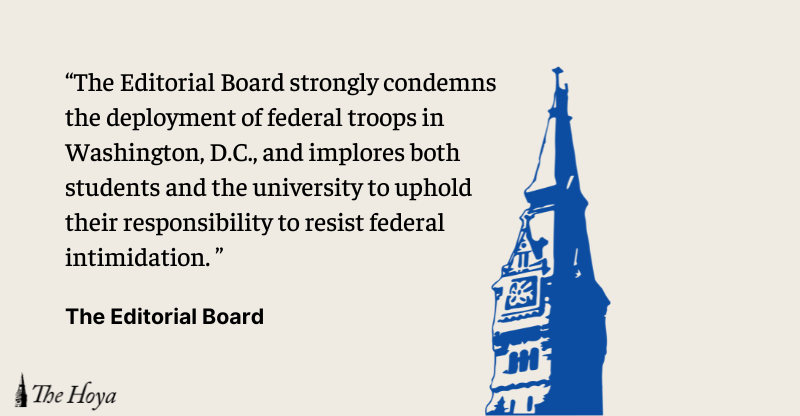
As new and returning students made their way to Georgetown University’s campus, a welcome-back barbecue and the promise of new classes awaited. Yet this year, students were also greeted with the threatening presence of thousands of federal agents in Washington, D.C.
President Donald Trump deployed National Guard troops to D.C. and federalized the Metropolitan Police Department (MPD) on Aug. 11 amid unsupported claims of reducing crime in the city. Just two days later, federal agents appeared on campus and in the Georgetown neighborhood.
The presence of federal agents in and around campus resulted in a noticeable shift for students in D.C.
Alessia Viscusi (SFS ’27) said she noticed the shift in the District the moment she returned to Georgetown.
“Instead of that beautiful view of the Capitol, what greeted me as I left Union Station were armored vehicles and uniformed troops,” Viscusi wrote to The Hoya. “It was only after seeing federal agents on near-empty streets that weeks earlier were bustling with families and street vendors that the reality of the takeover really sunk in.”
The Editorial Board strongly condemns the deployment of federal troops in Washington, D.C., and implores both students and the university to uphold their responsibility to resist federal intimidation.
This takeover is both unnecessary and expensive. President Trump characterized D.C. as having been overrun by “bloodthirsty criminals” to justify the federal takeover as a public safety emergency. Trump’s statement is ignorant of D.C.’s crime rate being at its lowest in 30 years. Even if D.C. did not have the capacity to prevent crime in the city, Trump should have followed well-worn paths established by the District’s police force, the MPD, including its previous introduction of proactive investigations and prosecutions to prevent crime without a need for federal force.
Overreach of federal power is always troubling, but especially so when the federal government decides it is appropriate to use the U.S. military as domestic law enforcement in the capital of the country and on your campus.
As such, the student body and university community have a moral responsibility to respond to these infringements on our campus and community. This is not a distant issue people will forget about the next day. As a Georgetown student, Washington, D.C., is your city and your home. It is not only a place for school but also a place for formative experiences and opportunities that you must protect for yourself and for future Hoyas.
As the federal takeover continues, photos are circulating of troops walking outside of Epi’s, driving down Tondorf Road and on M Street and Wisconsin Avenue. This constant presence serves little practical purpose outside of intimidation and control. It is our duty to stay vigilant.
The university has a responsibility to ensure its students feel safe, and in doing so, the administration must resist federal actions on campus. At the same time, the Editorial Board acknowledges the relative lack of power the administration wields in regulating federal actions on campus. To date, administrators have issued one public statement regarding police activity in D.C., saying that the university expects no significant changes to the interactions of Georgetown community members with police and troops.
Erik Smulson, university vice president for public affairs, said in an Aug. 14 email to the Georgetown community that he does not foresee significant changes to community interactions with law enforcement.
“You may notice an increase in law enforcement presence throughout the city, including in areas of our campuses that are open to the general public,” Smulson wrote in the email. “As always, we expect any law enforcement activity on our campuses to be conducted in a manner that respects the rights of our community members and fully complies with due process requirements.”
While troops are allowed in public areas of campus, their actions must respect the rights of community members and comply with due process.
The bottom line is that if the university is unable to act, students must be vocal and active instead. The Editorial Board encourages students to express their dissent with government actions through as many avenues as possible. From walk-outs scheduled on campus to city-wide marches, these protests are not performative. They drive media attention and ensure issues like this stay in the spotlight for those across the country who haven’t seen federal troops walking around their own campuses.
This type of community protest is especially important because it is a way to advocate for those who can’t stand up for themselves. The majority of students may not see immediate effects from the federal takeover, but, for some of us, the presence of armed federal agents can be a source of real fear and intimidation. The number of federal agents in the United States increased arrests of people lacking permanent legal status by more than tenfold in the initial Aug. 7 to Aug. 23 period.
Scout Cardillo (CAS, McCourt ’27), a student organizer for Free DC, a campaign to protect the District’s ability to control their governance, said the struggle against recent federal intervention extends beyond local issues.
“I’m fighting for not only my neighbors in D.C., but for my hometown,” Cardillo wrote to The Hoya. “Federal agents make no one feel safe outside of those who directly benefit from their presence and oppression.”
With the recent announcements of new planned deployments to Chicago and Baltimore, the situation will only escalate. As Georgetown students, we must do our part to resist the takeover of the city we have come to know as home.
The Hoya’s Editorial Board is composed of six students and is chaired by the opinion editors. Editorials reflect only the beliefs of a majority of the board and are not representative of The Hoya or any individual member of the board.